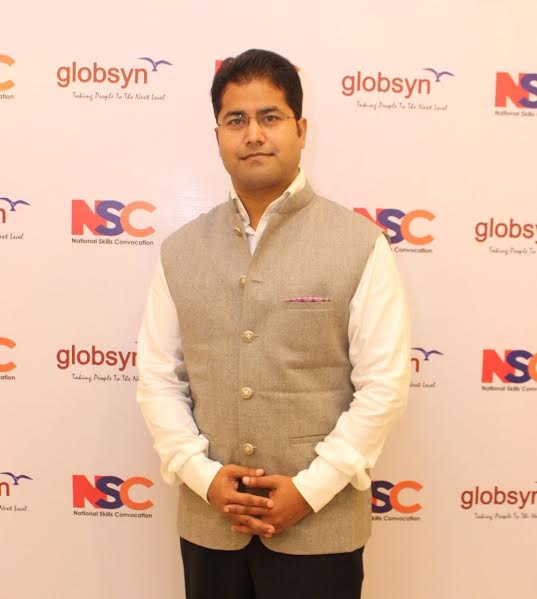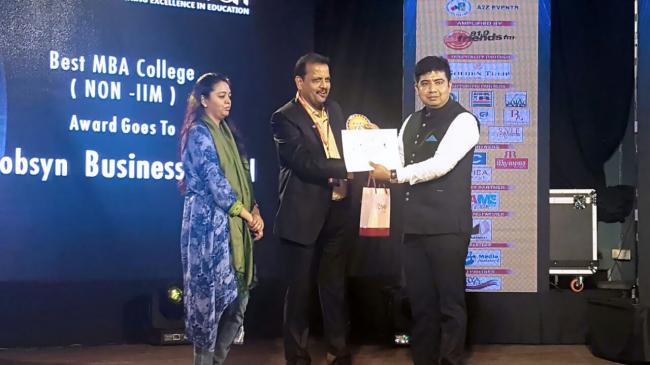
No student from Bengal should leave the state for business education, says Globsyn JMD
Tell me something about the Gurukul Award that Globsyn Business School has received. How was the experience?
We got the best MBA college (non IIM) award in eastern India for the academic session 2015-2016. We got a call for multiple categories but we got the award in the management education category. I think it is a good thing to be recognised.
What are the major areas of focus?
We have a major focus on vocational training and management education… an integrated system blending the two is very important, if you really want to have young students with relevant skills going in the market working with the corporates.
Over the past one and a half years, we have been working on various initiatives. Some of them are product definitions, getting students directly, the architecture of the programme, an integrated approach with the industry in terms of mentor-ship and their participation with the students in the classroom, and the agenda on apprenticeship programmes.
We have also introduced case studies. We are trying to do something beyond education. We will try to rank nationally in the future.
Please say something about your latest initiatives.
We are launching a programme called the 'board room'. Here you take a publicly listed company, form a board meeting and start the class with a board meeting. There will be a chairman who would address a problem of the company, and the students would research on the problems throughout the semester. So, in this way, they would get practical experience. We are going to revolutionise the curriculum. This is real MBA.
How far do you think rankings are important for your School?
Ranking is something that students give a lot of importance to because it summarises the overall performance of a business school. They do not have time to evaluate individual elements of a business school today. Ranking is important to us, but not as important as it is to students. We go for it because we want our students to know where we belong. For us, the relevance of ranking is to recognise where we belong internally, because education is a continuous journey, and it changes every year as the industry changes. The weightage of ranking changes over time. So I feel there will be the changes that would come in the rankings. In the field of management education, you need to go through some form of ranking every year to know where you are and also for your students. In that context, ranking is relevant.

How did the students respond to this Award?
We had a small party to celebrate the Award when it was officially handed over to the institute's director. All the students are happy about it. The most important thing is that they feel that they are responsible and they understand that they are equally important as stakeholders in the ranking.
Say something about the placements from your School at this not-so-good industrial situation in the country.
We never had an issue regarding placements. If you look at the country at large, there will be some institutions with placement issues. We have travelled almost two decades now. I think education matures over time and also you learn a lot about the market processes, same for us. You cannot have an entire batch placed, surely! That is not expected either. But this is an area where we keep trying to improve the students' skills and our engagement with the industry.
The whole idea is to integrate industry into your product life cycle, and that will prevent any placement issue. The industry is hungry for talent and they are not getting it. So if they get the talent, they are going to pay anything for it.
We have many ways, beyond recruitment, to align ourselves with the industry. We ensure the quality and level of placement, remuneration, and upward mobility. It starts with mentorship and ends with recruitment, and if we can blend it with apprenticeship this year, then it is going to reach a different level altogether.
So you are saying sufficient job opportunities are there, but do you think the talent is lacking in the industry?
Yes, we call it skill-gap. It is gap in demand and supply. It is because the engagement models are not integrated. I think the engagement model that we have taken up will reduce the skill gap and that is the way we are tackling this with more programmes and engagements with the corporate.
What about the market in Bengal? How far can the state retain its pass outs?
People have a perception that if they do not get a chance in IIM, then it is not worth the trouble. But I say, students can stay in their state (Bengal), and there would be another business school to give them an opportunity. I want to reduce the migration that would be a testament to say how good our institution is.
Talking about jobs, I would say, be in the place that is relevant. It can be Calcutta, Mumbai or the US, because the first year of the career is very important from creation of impression perspective. They must be flexible with the framework because if you say no to travelling, then you are probably saying no to a career that could be wonderful. The industry will not be going to you, but it is the other way around.
The students will have to choose between career and family responsibilities if that is the case, and the institution cannot be blamed for that. So the students will also have to be very clear about what they want to do with their career.
What is the selection process for students at Globsyn? What are the checkpoints?
Let me tell you the structure of the school first. The knowledge foundation has three layers, namely governing council, academic council and the institution with the Dean as the head.
Then you have the delivery side. We bring professors from different universities who actually take part in the selection process, and they give us a rating of the students.
We grade students in the selection examinations on different parameters, not only in terms of knowledge but also application, thinking and behaviour. Once the grading is done, we select the students. Letters are sent to the selected candidates. We are also planning to come up with new things that would be dynamic. We are always thinking how we can engage good students in the institution. From this year, the selection process also includes parents, because they are also important as stakeholders. They must know where they are investing… so we give a detailed presentation to them.
Do you think the luxurious campus of Globsyn could attract the students more?
See, initially the students may like the luxurious campus, but after six months, it becomes their home. In the long run it is the education. We have tried to build a good environment for studying. We have tried to build a corporate environment in the school itself, so that the students get a corporate exposure even before they start working. In this way, the infrastructure is relevant to them. The infrastructure is completely different from those of government schools.
You said that the awards do have an impact on the students. There are lot of institutions who pay for the recognition. So if you do not pay and miss the rankings, don't you think it would negatively affect the students?
Education is a long-term process. When an institution gets a paid award, its students after reaching half the course understand that the institution is not the same as it was projected. They realise it has been a wrong choice. To me, awards are not a one-year enrolment issue at all. I would like to have relevant awards in ten years.
But how would you get relevant awards even in ten years, as there are other institutions who would be paying to the award bodies?
No, there are certain award bodies who are genuine. We would stick to them. We do get to know who would take money and give the awards. So we can distinguish them. We want to earn the awards.
How would you get to know about the genuine award bodies?
We have a research cell which takes care of various issues. We also understand by interacting with the award bodies. Whenever they talk about money, we turn it down. So it takes time to get the relevant awards.
There are lot of meritorious students who cannot afford the course fees. How do you deal with them and allow the talents to flood in?
We will do something about this next year. As I said, recognition of meritorious students is important and we will figure it out. We want good students even if they can't afford the course financially. We will fix it up next year.
Whom do you prefer as a faculty in the school?
We prefer teachers with PhD as well as with practical experience. Teachers having no knowledge about the factories cannot teach… so practical experience is important.
Tell me the ways Globsyn can compete with other business schools?
It is always good to have a benchmark. My vision is, no child from Bengal should leave the state for business education. We have to understand the infrastructure of other schools, be attentive to benchmarks. We have amazing governing council advisers coming from academia and industry, and the merging of both would be beneficial.
(Image by Sandip Roy)
Support Our Journalism
We cannot do without you.. your contribution supports unbiased journalism
IBNS is not driven by any ism- not wokeism, not racism, not skewed secularism, not hyper right-wing or left liberal ideals, nor by any hardline religious beliefs or hyper nationalism. We want to serve you good old objective news, as they are. We do not judge or preach. We let people decide for themselves. We only try to present factual and well-sourced news.







